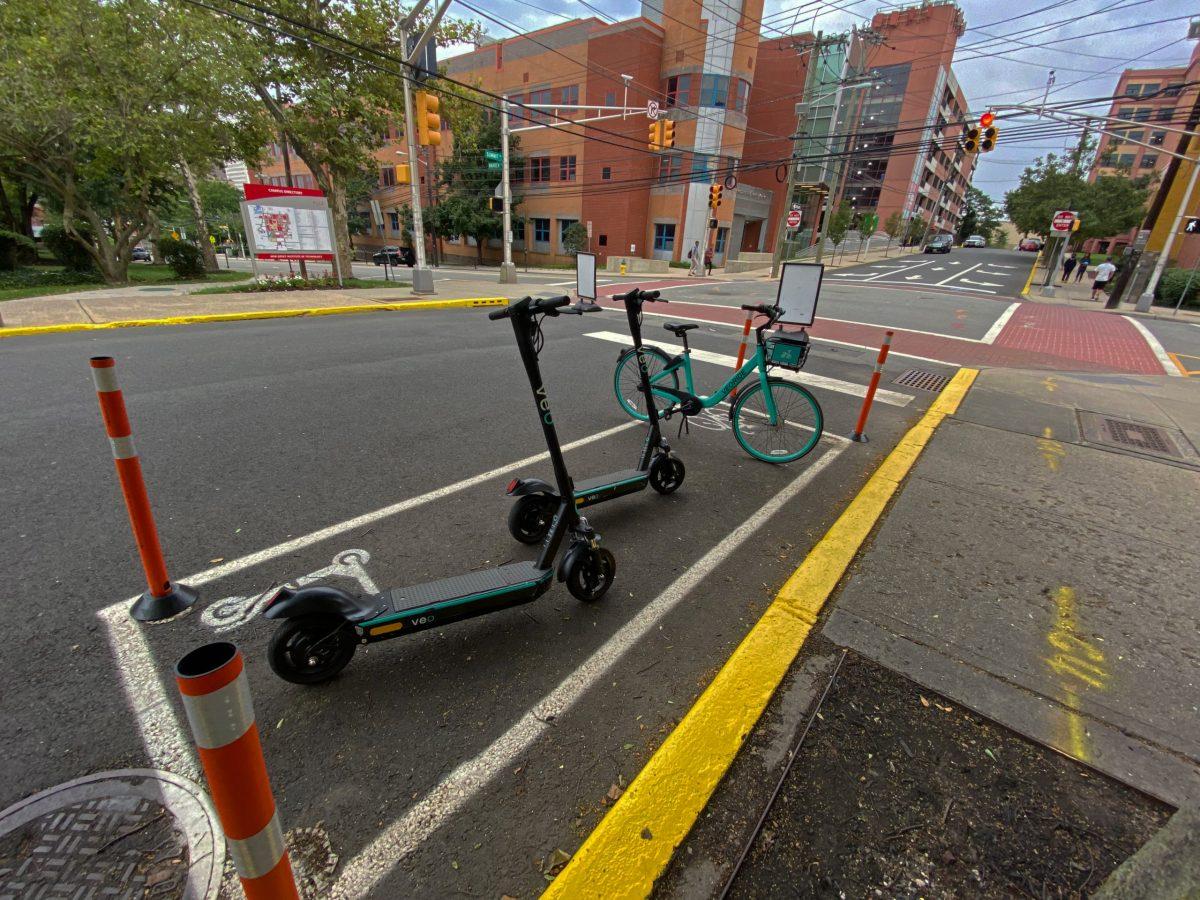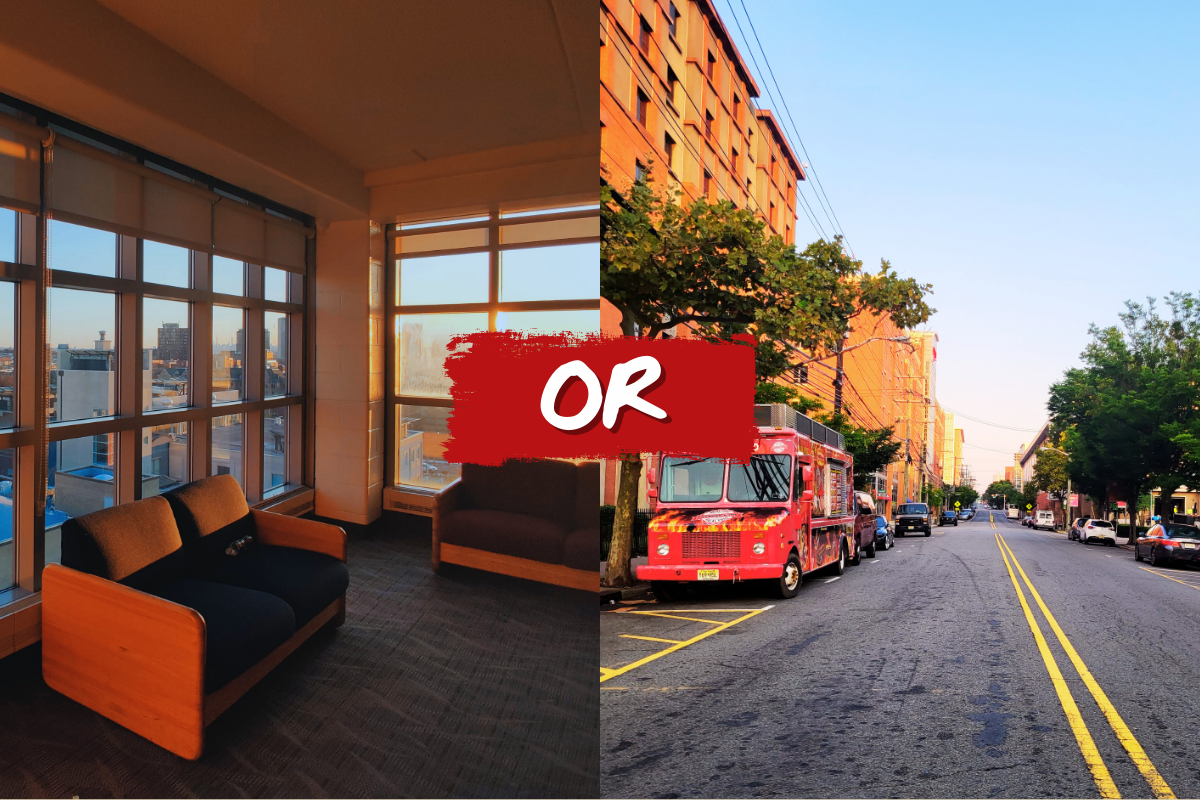In July 2021, Newark launched its first ever city-wide rental vehicle initiative in the form of a six-month pilot program called NewarkGo. Through this program, people can rent electric e-scooters and manually operated bicycles, similar to the existing shared bicycle system, Citi Bike, in cities like New York City and Philadelphia. NewarkGo was launched with environmental and equity goals in mind. According to Mayor Ras Baraka, almost 50% of Newark residents do not own a car, so implementing this program will hopefully make safe, easy and affordable transportation more accessible to the community.
“I’ve been looking into micro mobility as a solution to some of our last mile connection, transportation issues in the city for two years now,” said Robert Thomas, Chief of Energy and Environment at City of Newark and NJIT alumnus (Mechanical Engineering Technology, 2010). The last mile connection is a transportation infrastructure term, referring to the gap between where public transit ends and the final destination of a passenger. Thomas travelled to several cities around the country to observe how others have been managing similar programs for this issue. “With everything going on with kind of the maturity of the [micro mobility] industry, and also the need to support mobility within the city, we felt like this was a good time to really watch this pilot project to really test out some of these theories that were being presented as solutions to some of the issues that we’ve experienced in the past.”
“We’ve worked very hard during the pandemic to put together a set of rules and regulations that we feel will really help us understand how residents and commuters are navigating their way through the city — where they’re going, how long it’s taking them to get there, how quick trips are — to help us essentially understand how we can support similar programs in the future. We’ll also see how we can improve our transportation infrastructure to get a better sense of the mobility happening. Ultimately, the data from the pilot will lead to a more granular approach to our transportation planning future.”
The city of Newark partnered with two companies, Bird and VeoRide, to operate the rental vehicles. Users can access e-scooter and bike rentals by downloading an app from either Bird or VeoRide. Both apps work similarly, with a map showing the locations and rates of nearby rentals from the respective companies, a QR code scanner used to scan the vehicle once approached in person and safety instructions. The Veo app additionally displays the charge percentage of e-scooters.
Initially, students could be seen zooming around campus on e-scooters over the summer, and rentals were available directly on campus, including locations such as the Honors Green and the intersection of Summit Street and Warren Street. However, before the start of the fall semester, NJIT had declared its campus a “No Ride Zone” due to safety concerns and the operators began relocating their hubs. “At the request of NJIT, the Newark campus is a No Ride Zone. We have moved our hubs off the NJIT campus to keep up service for you!” read a notification from the Veo app on Sept. 1.
Andrew P. Christ, Sr. Vice President for Real Estate Development and Capital Operations at NJIT, stated that “based on safety concerns experienced by pedestrians on campus during the launch of the program, my office, Public Safety and the Dean of Students determined, in the best interest of the health and safety of our campus community, the scooters would not be operable within the confines of the NJIT campus. We fully support the program and look forward to students using the scooters to visit local restaurants and other points of interest within Newark, which is the intent of the program. A similar policy was enacted in 2016 regarding hoverboards based on similar concerns. Skateboards, bicycles, and manually operated scooters remain permitted on the campus.”
Thomas agrees with the policy, recalling a similar situation when he himself was an undergraduate student at NJIT in the ‘00s. “Safety is a priority for the city in launching this program … I remember as an undergrad years ago, I believe the skateboarding policy had just come in. A lot of my friends were skateboarders, and people were upset about the policy, but ultimately, it was also designed to help keep people safe. It can be very difficult sometimes to navigate from the dorm rooms to some of the faculty buildings, with the crowds of students walking. Having a scooter coming to you at like 50 miles an hour could be challenging.”
“We’ve had discussions with Rutgers pretty early on with a similar policy and approach,” continued Thomas. “I would say safety is a priority for us. We definitely recognize that on campus property, they want to keep people safe as well. And so, we’re working together to try to figure out and learn what the best policy would be for use on NJIT and university property throughout the program, during the pilot period and potentially in the future.”
“We try to always be very fluid in our dealings with local facilities, local universities, local partnerships to provide the best fit and the best service, and part of that is in recognizing a university or partnership’s needs and acting in response to that to provide that,” said Roger Gonzales, Global Ops Manager from VeoRide. “In regards to NJIT’s wanting to have that policy for no right zone, I think part of it is that this is a new program. Everyone is still adjusting to how such a program would integrate with their facility operations and such.”
Despite no longer having hubs directly on campus, the NewarkGo rentals are popular with students and other Newark residents. A combined total of 2,000 e-scooters and bicycles are already in Newark, from both Bird and VeoRide, and program leaders are expecting the demand to increase.
“In Newark, we’re seeing an average of 500+ rides per day but expect that to increase pretty quickly as we increase the size of our fleet! Right now, we have 600 vehicles in Newark, and over the next month we are excited to bring in 400 more,” said Ana Malladi, General Manager at Bird. “This will include our brand new pedal-assist BirdBike! We definitely look forward to providing sustainable transportation options to many NJIT students in the near future as the program develops.” VeoRide was also contacted with similar questions regarding usage statistics but has not yet responded at the time of publication.
To promote the NewarkGo pilot program, Bird recently participated in two Newark community events: a church-organized back-to-school drive on Aug. 28, and Newark’s annual Brazilian festival on the Sep. 10 – 12 weekend.
“We have been working closely with Rev. Dr. David Jefferson Sr of the Metropolitan Baptist Church. Most recently, we participated in their Willing Heart Community Center back-to-school drive: distributing free helmets, promoting discount pricing programs for low-income residents, and donating one of our Bird Air scooters to a raffle for young adults receiving vaccinations,” said Malladi. “We also teamed up with a local business to take part in Newark’s annual Brazilian Festival last weekend. We offered free helmets and demo rides following the festival and truly enjoyed the opportunity to engage with car-free residents in the Ironbound neighborhood!”
“We also have our university partnerships team who emphasizes outreach to local anchor institutions, namely Rutgers and of course, NJIT,” added Thandi Nyambose, Government Partnerships Associate at Bird. “We also continue to partner with Newark Park Foundation, Newark People’s Assembly, as well as New Jersey Bike & Walk Coalition, who Rob [Thomas] connected us with on safety outreach, and education. In terms of safety, we’ve really provided the latest and newest scooter technology, and we can also expect our Bird bikes to roll out throughout the week of the 20th of September and they are brand new, so we’re really excited to deploy those as well.”
Although there were some challenges in launching the program, from predicting where demand would be and where to place rentals, to prioritizing safety in a busy city with few existing designated bike lanes, to ensuring there would be affordable pricing options, NewarkGo has been a success for the city of Newark. Going forward, the initiative directors will continue to monitor the pilot program and make changes as necessary to allow for greater dispersion of the vehicles and increased access.
“We’re all learning how to operate in this area, with the data and experiences, with what’s critical in the feedback from the community,” said Alex Keating, Director of Public Policy and Partnerships from VeoRide. “So we’ve got a lot more learning to do during the pilot, and hopefully we can actively sort of tweak things and improve things as we go. But I think it’s really the city’s job, and they’re on top of it so far.”
“The intended purpose of this program is not just for recreational use, but the scooters and the vehicles are also for allowing safe, affordable, equitable transportation options to the community as a whole,” said Thomas. “We want to be able to support this growing community to help us achieve our transportation goals, our Newark Forward goals, and our greenhouse gas emission goals. And I think that this could really help us in the long term, to get more cars off the road and make sure that we create safe spaces.”


































